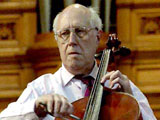Today.Az » Society » Rostropovich cherished 'mystical city' of his birth
28 April 2007 [11:14] - Today.Az
Mstislav Rostropovich was only four years old when his family left Azerbaijan for Moscow, but the legendary cellist never forgot his roots in this ancient city on the shores of the Caspian Sea.

Rostropovich, who died Friday aged 80, returned many times over his extraordinary life to the capital Baku, where he first learned to play the piano, sitting on his mother's knee. In a museum created in the small apartment where he was born, a prize exhibit is a black-and-white photograph of the infant Rostropovich wrapped in a blanket, lying in his father's cello case. Celebrating his 70th birthday here in 1997, Rostropovich called Baku "a mystical city" and praised its diversity and long cultural traditions. And though he only lived here a short time, the people of Baku proudly claim him as one of their own. In a letter to Rostropovich's widow, President Ilham Aliyev said all Azerbaijan shared in his family's grief. Rostropovich "was truly a citizen of the world, a great public figure, a person of the highest morals who always and everywhere defended the ideas of humanism.... He will always remain in our memories," Aliyev wrote. At the museum in his honour, the Rostropovich Home Museum, director Shoyla Heydarova was tearful when she learnt of the musician's death. "He was a great man and a great patriot of Baku," she said. "He may have been famous all over the world, but he never forgot where he came from." Rostropovich was born in Baku in 1927 after his father Leopold, a cellist, and mother Sofia, a pianist, arrived here from Russia in 1925 to teach at the city's newly opened music academy. In a 2002 interview he said one of his first memories was hearing his parents rehearsing in the Baku apartment. "By the time we left Baku, when I was just four years old, I was already crazy about music and had already started playing the piano," he said. An ancient stop on the Silk Road trading route between Europe and China, Baku had become one of the Soviet Union's most cosmopolitan cities thanks to a turn-of-century oil boom that had lured a wide range of peoples. As well as Azeris, it was home to many Russians, Jews, Armenians and Georgians. Heydarova, who met the famed musician many times, said the culture of the city had a deep impact on Rostropovich. "They say that personalities are formed in the very early years of life and I believe that it was here in Baku that Rostropovich learned some of his most important qualities -- his openness, his tolerance, it all came from here," she said. After launching his career in Moscow, Rostropovich returned to Baku in 1971 to trace his roots. After finding his birthplace, he performed five free concerts in the city, attended by thousands and to great acclaim. "It was like a national holiday," Heydarova recalled. After he fled the Soviet Union in 1974, Rostropovich could not travel again to Azerbaijan until it became independent with the collapse of the Soviet Union in 1991. But he then returned often, giving dozens of performances and luring many famed musicians to join him in concerts in the city. Following in his father's footsteps he spent a week every year giving free masterclasses to cello and violin students at the State Musical Academy. "He was very generous and was of enormous value to the development of Azerbaijan's musical culture," said Farhad Badalbeyli, the academy's rector. "He always saw Azerbaijan as his native land. He very much loved Baku and the people of Baku loved him in return." Rostropovich also funded a range of charity works in Azerbaijan, including a programme to immunize children from diseases. He was heavily involved in the creation of the Rostropovich Home Museum and donated dozens of heirlooms and family pictures for its opening in 2002. By Michael Mainville /BakuTODAY.NET/
|